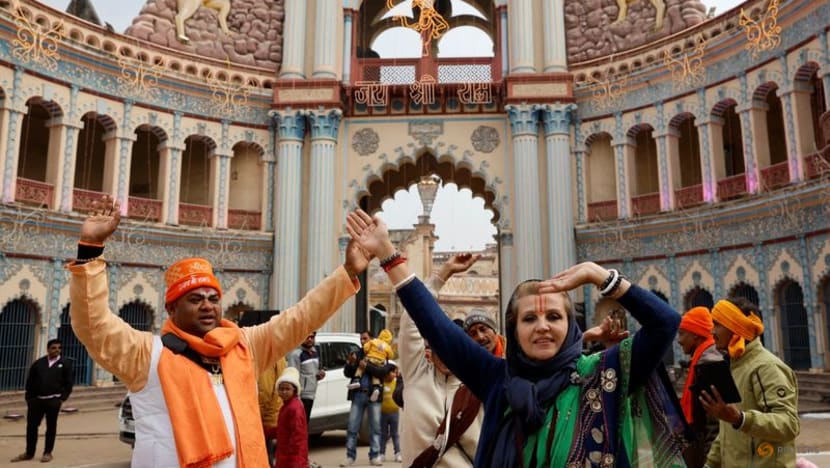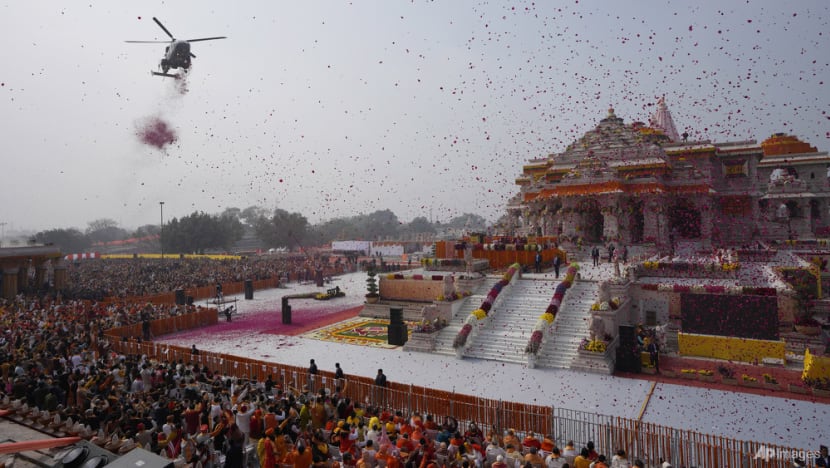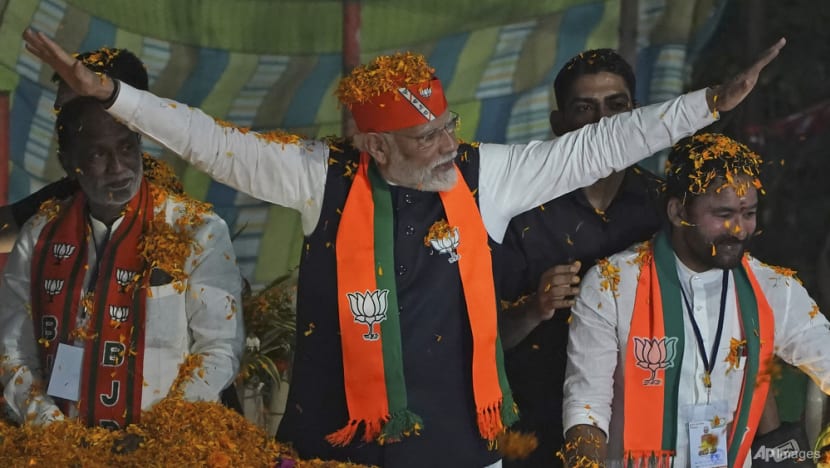CNA Explains: What are the political implications of the new Ram temple in India?
Why is the temple controversial and how will it figure in upcoming elections in the world's most populous country?


This audio is generated by an AI tool.
SINGAPORE: India's Prime Minister Minister Narendra Modi on Monday (Jan 22) inaugurated the new Ram temple in the northern town of Ayodhya.
Observers say it signals the unofficial start of his re-election campaign, as his Bharatiya Janata Party (BJP) seeks a third consecutive term in power.
Why is the temple controversial?
The new temple is built on the site where Ram, one of the most revered Hindu gods, was believed to have been born more than 7,000 years ago.
A mosque stood there for centuries before it was torn down in 1992 by Hindu mobs led by senior leaders of the BJP, some of whom are still around, said Dr Ronojoy Sen, senior research fellow at the Institute of South Asian Studies in the National University of Singapore (NUS).
It triggered the worst religious riots in India’s post-independence history, killing 2,000 people, most of them Muslims, Dr Sen told CNA’s Asia Now on Monday.
The dispute over the site stretches even further back to the late 19th century, and cropped up in India soon after independence in 1949 when idols of Lord Ram were found inside the mosque.
But it was in 2019 that a Supreme Court ruling paved the way for the construction of the temple.
In a sense, the BJP’s rise from a marginal party in the 1990s to the behemoth that it is now, was predicated by the movement demanding that a temple be built where the mosque once stood, said Dr Sen.
What does it say about India's mix of religion and politics?
Dr Sen described the temple's grand inauguration ceremony as "a watershed moment that is as much religious as it is political".
"It is for many Hindus, the righting of historical wrong. For some, it is a moment of immense religious significance,” he said, while pointing to the level of involvement of the state apparatus in the ceremony.
In an extravagant event attended by political bigwigs such as Mr Modi and Uttar Pradesh Chief Minister Yogi Adityanath, military helicopters showered flower petals from the sky. All central government employees were also given half a day off.
Dressed in flowing, golden-coloured traditional dress, Mr Modi himself unveiled a black stone idol of the deity Ram in the heart of the temple.
Brown University’s Mahatma Gandhi Associate Professor of Political Science and International Studies Prerna Singh said it was unprecedented in the history of India, and also among secular countries, that the head of the executive arm should take on the symbolism of a high priest of a religion.
“It is also notable that it has a certain drawing on other religions such as Christianity and, ironically, Islam, in a way to kind of cast Ayodhya … as a kind of Rome or Mecca,” she told CNA’s Asia First on Tuesday.
She said this not just blurred but erased the line between politics and religion in India.

Assoc Prof Singh said the temple’s inauguration undermined one of the founding constitutional principles of India, which is that it is a secular country with equal rights for citizens of all religions.
It sends “a very clear signal” to India's Muslim minority, which has often been subject to violent discrimination under the BJP regime, she added.
The new temple also undermines institutions such as the judiciary, whose judgment actually cleared the path for the building of this temple, she noted.
The site represents how India has veered towards Hindu nationalism over the years, said Assoc Prof Singh.
“In 1992, it was very much a site of conflict and of this Hindu identity that was just being mobilised. What you're seeing today is the ascendence, the hegemony (and) the triumph of this Hindu (identity) that has been so central to the ruling party and the Prime Minister,” she said.
Dr Sen said that unlike the 1992 incident, the new temple’s inauguration was unlikely to trigger a fresh wave of violence.
This is due to a high level of security around the country, and the current state of the Muslim minority which is “more fearful of the situation rather than prone to sort of take up acts of violence”, he said.
Several violent clashes erupted last year between Hindus and Muslims during Hindu processions in states like Haryana and Gujarat.
How will it impact India's politics?
The opening of the Ram temple will be a staple of the BJP’s manifestos in the upcoming election, said Dr Sen, calling it a big part of the party's agenda along with the abrogation of the special status of Kashmir.
He noted that the timing of the opening - ahead of the complex not being fully completed - was also interesting and politically significant.
“Logically, the opening should have been on the birth date of Lord Ram and will fall in mid-April this year. But if it was done so, by then the elections would've already started,” said Dr Sen.
“So the very fact that it is being done with so much fanfare in the run-up to the elections is a clear indication that the issue is likely to play a very prominent role in the election campaigns.”
Voters in the world’s most populous country will head to the ballot boxes in elections from April to May this year, though the exact dates have not been announced.
Observers noted that some opposition parties, including the Indian National Congress, boycotted the inauguration, a move which Dr Sen said may not sit well with the electorate.
While certainly a political event, the issue is a highly emotive one for many Hindu voters across the country, with emotions played up in a concerted fashion by the BJP and through rallies by Mr Modi, as well as on social media, he said.
“If the opposition does not have a clear stand on that, I think that's going to harm (their) prospects ... If they're sort of seen as anti-Hindu or anti-religious, that is not going to do them very well in the elections,” said Dr Sen.

Assoc Prof Singh noted that the temple’s opening should be seen also in the context of the BJP’s decades-long effort to push a Hindu nationalist identity.
This includes the reference to India as Bharat on the world stage, in line with the Modi government driving the increased use of Hindi.
“It is important to see it in the timing of the elections and the electoral gains that it promises among a radicalised Hindu majority in a highly polarised political climate,” she said.
However, it also begs the question of how far such symbolism will take the BJP in a political contest, she noted.
“Will questions of identity politics, symbolism (and) exclusionary nationalism be able to carry the day against very real issues of rising poverty, rising unemployment, malnutrition and stagnating social indicators (such as) an all-time high in the lack of female labour force participation?”
Assoc Prof Singh said in order to mount a challenge, the opposition needs to construct a narrative that returns not just to the constitutional principles of secularism, but also highlights some of the failings of the present regime.
What are the implications abroad?
For one, despite the controversial background, the opening of the Ram temple could contribute to Delhi's soft power projection in parts of the region, said Mr Kalicharan Veera Singam, a senior analyst at the S Rajaratnam School of International Studies (RSIS) in Nanyang Technological University (NTU).
To many Hindus and some Buddhists in Southeast Asia, India is a religious and cultural fount and will remain that way, he told CNA.
Hinduism has historically heavily influenced religious and cultural practices in parts of Southeast Asia. And aspects of Buddhist traditions in Thailand and Cambodia were also shaped by Hindu traditions since ancient times, he explained.
In predominantly Hindu Bali, for instance, the Hindu-epic Ramayana is very popular and figures prominently in how the religion is observed in the island, said Mr Singam.
“The Ram temple opening will have a religious appeal to segments of Hindu and Buddhist communities in some Southeast Asian countries,” he said. "(It) can rejuvenate cultural and religious links between India and Southeast Asia."














